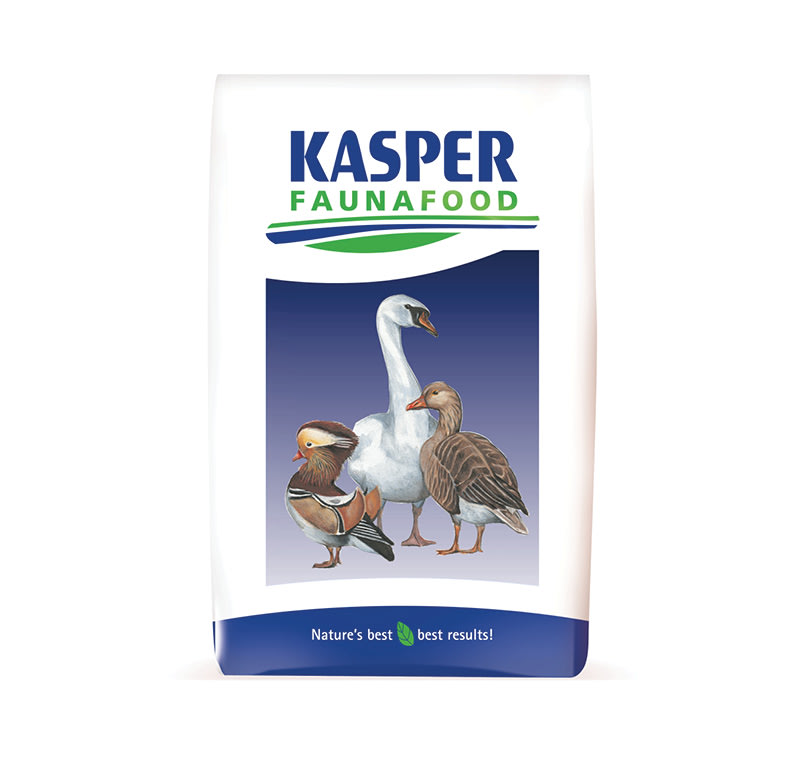
Floating for adult waterfowls
Recommended daily feed intake
Feed intake depends on breed and age, but mainly on the size (weight) of the waterfowl
In the winter period, the maintenance requirement is higher due to the absence of 'natural' food and the lower outside temperature
Waterfowls may be fed without restriction
Waterfowls that are kept in a spacious outdoor enclosure with natural vegetation can do with less food per day
Always provide sufficient fresh drinking water
Provide grit and stomach gravel to properly grind the grains in the gizzard, only necessary if not present in the daily diet
Seaweed and Spirulina
Algae are found in freshwater and saltwater all over the world. Seaweed is a large, complex type of algae, Spirulina is a microalgae (single-celled). Like plants, algae can create oxygen through photosynthesis. They are a very important group of organisms and form the basis of biodiversity in seas and oceans. Spirulina is a micro-algae that has become known as a food supplement because of the many essential nutrients it contains. It is a natural source of amino acids, omega-3 fatty acids, vitamins, minerals and carotenoids (including zeaxanthin). And several studies find positive effects of mircoalgae on animal health. In addition, seaweed contains an array of bioactive compounds that contribute to animal health. With seaweed and Spirulina we add very specific natural food sources for waterfowls to the feeds.
Floating for adult waterfowls
Anseres Micro (Starter) Floating
Young ornamental waterfowls; to be sprinkled in water several times a day during the rearing period from 0-12 weeks of age. Stilt-walkers: to be provided during the entire life phase.
A special rearing feed with fish meal (11%) and a protein content of 22%.
For specific (young) ornamental waterfowls and waders that naturally have a higher maintenance need
This floating feed can be fed on the water. Because the feed moves on the water, it is quickly absorbed by young animals.
The added seaweed contains a range of bioactive substances to support the immune system
Contains spirulina, a rich natural source of amino acids, vitamins, minerals and carotenoids (including zeaxanthin)
Download the composition here
Available in: 15 kg (Item number: 6148)
Anseres Floating
To be given on the water from the age of 12 weeks
A special feed with fish meal (16%) and a protein content of 20%.
For an optimal condition of ornamental waterfowls that like to eat on the water
Rich in vitamins and organically bound trace elements (including zinc and selenium) to support good health and beautiful feathers
Rich in omega-3 fatty acids from fish
The nutrients support a proper course of the moulting period
Download the composition here
Available in: 15 kg (Article number: 6165)
Anseres Sea Ducks Floating
To be given on the water from the age of 12 weeks
A special feed with a high fishmeal content (32%) and a protein content of 30%.
For an optimal condition of sawbills, goldeneyes, eider ducks, sea ducks and shorebirds.
Rich in vitamins and organically bound trace elements (including zinc and selenium) to support good health and beautiful feathers
Rich in omega-3 fatty acids from fish
The nutrients support a good course of the moulting period
Download the composition here
Available in: 15 kg (Article number: 6160)
Recommended daily feed intake
Feed intake depends on breed and age, but mainly on the size (weight) of the waterfowl
In the winter period, the maintenance requirement is higher due to the absence of 'natural' food and the lower outside temperature
Waterfowls may be fed without restriction
Waterfowls that are kept in a spacious outdoor enclosure with natural vegetation can do with less food per day
Always provide sufficient fresh drinking water
Provide grit and stomach gravel to properly grind the grains in the gizzard, only necessary if not present in the daily diet
Seaweed and Spirulina
Algae are found in freshwater and saltwater all over the world. Seaweed is a large, complex type of algae, Spirulina is a microalgae (single-celled). Like plants, algae can create oxygen through photosynthesis. They are a very important group of organisms and form the basis of biodiversity in seas and oceans. Spirulina is a micro-algae that has become known as a food supplement because of the many essential nutrients it contains. It is a natural source of amino acids, omega-3 fatty acids, vitamins, minerals and carotenoids (including zeaxanthin). And several studies find positive effects of mircoalgae on animal health. In addition, seaweed contains an array of bioactive compounds that contribute to animal health. With seaweed and Spirulina we add very specific natural food sources for waterfowls to the feeds.
